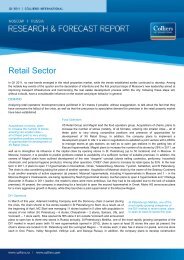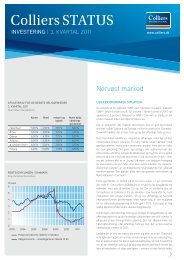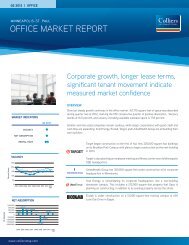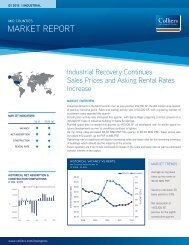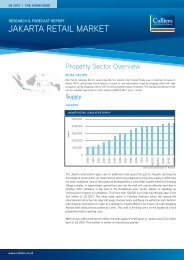Österreich 2013 - Colliers International
Österreich 2013 - Colliers International
Österreich 2013 - Colliers International
Sie wollen auch ein ePaper? Erhöhen Sie die Reichweite Ihrer Titel.
YUMPU macht aus Druck-PDFs automatisch weboptimierte ePaper, die Google liebt.
Marktbericht | Office | <strong>2013</strong><br />
<strong>International</strong>e Trends<br />
In den internationalen Büromärkten vollziehen<br />
sich derzeit einige Veränderungen, die in<br />
Zukunft auch den österreichischen Markt<br />
langfristig prägen und neue Anforderungen an<br />
das Bürovermietungsgeschäft mit sich bringen<br />
werden.<br />
1. Flexiblere Mietverträge<br />
Der Trend geht tendenziell zu flexibleren<br />
Mietverträgen und kürzeren Vertragslaufzeiten.<br />
Eine der Ursachen dafür liegt im<br />
technologischen Wandel, der neue, flexiblere<br />
Arbeitswelten erfordert. Zusätzlich hat sich<br />
die Verhandlungsposition der Vermieter vor<br />
dem Hintergrund steigender Leerstände<br />
zugunsten der Mieter verschoben, wobei die<br />
Unternehmen nicht in erster Linie auf kürzere<br />
Vertragslaufzeiten pochen, sondern vor allem<br />
auf eine flexiblere Vertragsgestaltung (zum<br />
Beispiel Sonderkündigungsrechte für<br />
Teilflächen oder anpassungsfähigere<br />
Betriebskosten) verlangen.<br />
2. Nachhaltigkeit<br />
Der Nachhaltigkeitsaspekt und Zertifizierungen<br />
gewinnen in den internationalen Büromärkten<br />
weiter an Bedeutung. Federführend sind hier<br />
– vor allem im Großvermietungsbereich – die<br />
Büronutzer, die bereits vielfach in ihren<br />
Unternehmensgrundsätzen die Ökobilanz<br />
verankert haben.<br />
3. Aktives Asset Management<br />
und Serviceorientierung<br />
Insbesondere bei der Suche nach Büroflächen<br />
in Prime Locations setzen Unternehmen<br />
verstärkt auf umfassende Beratungsmandate,<br />
die eine Immobilien- bzw. Standortstrategie<br />
mit den Unternehmenszielen in Einklang<br />
bringt. Während dies vor ein paar Jahren<br />
ausschließlich ein Thema für große,<br />
international tätige Konzerne war, nehmen<br />
inzwischen immer häufiger auch heimische<br />
Unternehmen derartige Services in Anspruch.<br />
1. More flexible rental<br />
contracts<br />
The trend is moving towards more flexible<br />
rental contracts and shorter contractual terms.<br />
One of the reasons for this is technological<br />
change, which demands new and more flexible<br />
working environments. In addition, the<br />
negotiation position of lessors can shifted to<br />
benefit tenants against the background of<br />
increasing vacancies. However, companies do<br />
not insist in the first instance on shorter<br />
contractual terms, but rather try to ensure a<br />
more flexible contract design (for example,<br />
special rights to terminate partial areas or more<br />
adaptable operating costs).<br />
2. Sustainability<br />
The sustainability aspect and certifications are<br />
continuing to grow in significance in the<br />
international office markets. The drivers of this<br />
development – especially in the field of large-scale<br />
rentals – are primarily the office users, many of<br />
whom already have the ecological balance<br />
anchored in their fundamental company principles.<br />
3. Active asset management and<br />
service orientation<br />
Especially when searching for office space in<br />
prime locations, companies are placing greater<br />
emphasis on comprehensive consultation<br />
mandates that can harmonise a property or<br />
location strategy with the goals of the company.<br />
While in the past this was an issue only for<br />
large, globally active concerns, domestic<br />
companies are now availing increasingly of<br />
such services.<br />
4. Investments in selected stable<br />
markets<br />
Despite the severe movement in the financial<br />
and investment markets in recent years,<br />
investment in office real estate – especially in<br />
the relatively stable markets in Germany,<br />
Austria and the Netherlands – remains very<br />
popular and is even increasing slightly.<br />
The crisis is subsiding<br />
but still entails risks.<br />
<strong>Colliers</strong> <strong>International</strong> | S. 15



